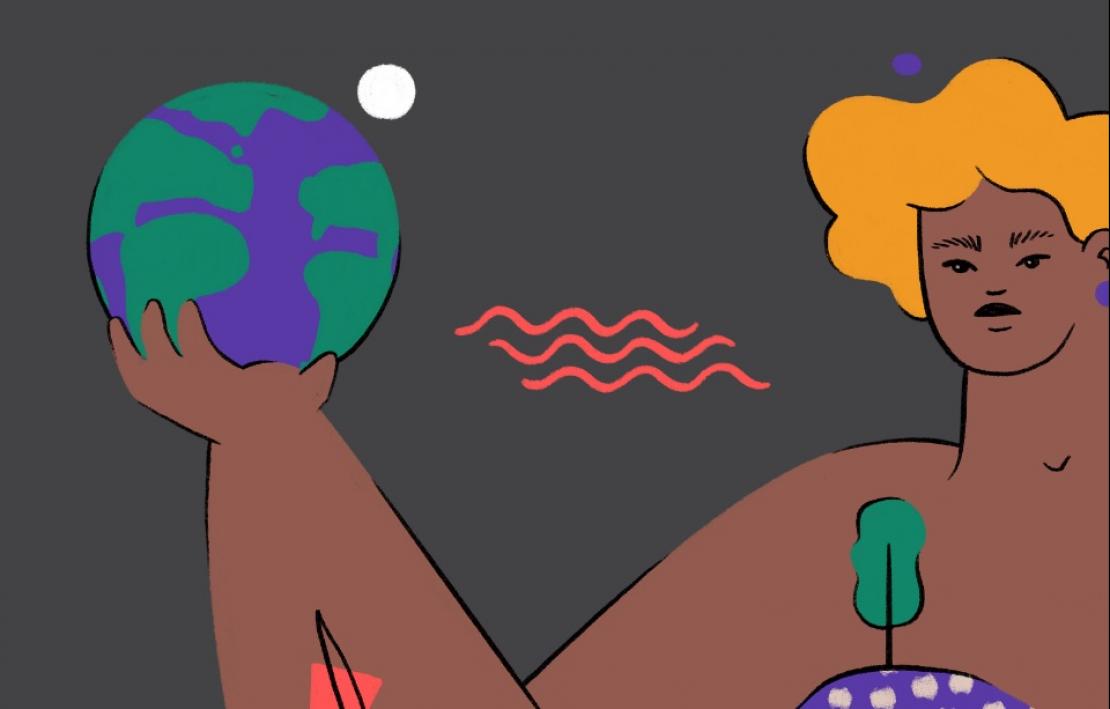In her column, Gülseren Onanç, the Founding Chair of the SES Equality and Solidarity Association, evaluates the UN Climate Summit from the gender and youth perspective and proposes feminist economy that questions the foundations of the capitalist system as a model to fight against gender equality and climate crisis.
Gülseren Onanç
Our eyes are on the UN Climate Summit, COP26, held in Glasgow at the moment. These summits, held since 1995, have facilitated essential steps to tackle the climate crisis. The Kyoto Protocol was signed in 1997, but as it could not put the necessary pressure on nation-states, the Paris Agreement was signed in 2015. Even though most states argue that they comply with the Paris agreement, greenhouse gas emissions and, accordingly, global warming and climate change continue.
In the opening speech of the summit, Antonio Guterres, referring to global warming, said, “Either we will stop it, or it will stop us. It’s time to say enough is enough. “We are digging our own grave.” The decisions to be taken at this meeting, which was attended by approximately 30 thousand people from all over the world, including heads of state, diplomats, activists, business people, lobbyists and journalists, are critical for the future of the world. When we look at the past 26 years, there are many reasons to be hopeless. Many commentaries like the one The Economist magazine state the COP-26 meeting will be as disappointing.
Great support to the call from young women climate activists
Four of the world’s leading climate activists, Greta from Sweden, Vanessa from Uganda, Dominica from Poland and Mitzi from the Philippines, wrote an open letter to world leaders. In a very short time, 1.5 million people around the world signed the letter, which lists what needs to be done urgently to save our future.
“Concerned youth” for climate change
As Greta Thunberg’s exemplary activism demonstrated to the world, young people are most worried about the climate crisis. According to the study conducted by the University of Bath in England in partnership with universities in Finland, the USA and the UK, which is stated to be the most comprehensive survey in this field, 60% of young people describe themselves as “very worried” or “extremely worried” about the climate crisis. On the other hand, 45 percent state that climate change has affected their daily lives somehow. Again, two-thirds of young people think that the future will be frightening, and 56 percent believe serious disasters await humanity.
Overall, a significant number of young people feel betrayed, ignored and left alone by politicians and adults. The words of one of the young people who participated in the study, “I don’t want to die, but I don’t want to live in a world where children and animals are not cared for”, show the relationship of young people with the climate crisis and political powers.
Women leaders are needed to tackle the climate crisis
There is not enough representation of women in decision-making mechanisms in the fight against the climate crisis. Activists warn that the low representation of women in senior positions in climate negotiations is worrisome for the future of the world. “The absence of female leadership in climate decisions affects our economy, social structure, creativity and ability to find solutions,” they say.
Mary Robinson, Ireland’s former president and head of the Elders group of world leaders, says women and girls need to be put at the center in the context of the climate crisis. As she underlines, women need to be included at the negotiating table. As she states: “The Covid crisis has exacerbated gender inequality; we need to develop a gender action plan.”
We need a just order
Climate activists demand a change to this patriarchal system. Feminist economists question the foundations of the capitalist system, which produces income inequality and poverty, causes the climate crisis and increases fear and violence. In her article, feminist academic Silvia Federici states that we urgently need a just social order to produce alternative policies for the current economic system. She emphasizes the need to evaluate feminist economics from a historical perspective.
Federici underlines that the exploitation of women “increases capitalist accumulation and strengthens the exploitative power of capitalism.” She further states that “Feminist economists work in the lion’s cage and try to change the discipline that is tied most to the capitalist power structure”. By building on this critique Federici states that gender inequality, the devaluation of care work and social relations are central issues of the feminist movement.
As she states: “If 500 years of capitalist development—500 years of colonization, occupation, dispossession—have not produced enough wealth to warrant our reproduction, and if all we can expect from the world economy is more austerity, it is time to say that the capitalist economy is not sustainable for the majority of the planet’s population.”
Making the gun that kills children is “productivity” but child-raising care service isn’t?
Marilyn Waring, the author of the book ‘If Women Counted’ (1988), which is considered one of the founding works of feminist economics, criticizes the international standards of economic growth because it excludes nature and reproduction. Waring criticizes that while producing weapons that kill children is considered ‘productive’, care services that help children grow are not included in productivity.
Now is the time for a purple and green economy
Now is the time for building a future that is green and purple.


